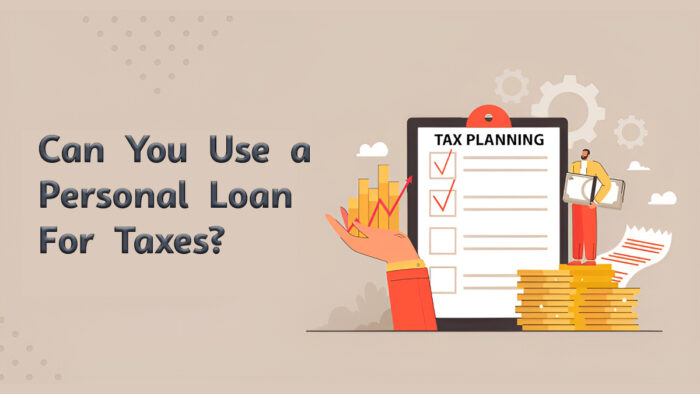For individuals who rely on taking out a personal loan to meet unexpected or sudden expenses, the question of using a personal loan for taxes always comes up.

For people who are searching for alternative methods to manage their tax responsibilities and unforeseen tax bills, they might end up considering a personal loan to solve this problem.
However, it is important to know that this process needs mindful consideration and an understanding of the possible risks involved as well.
How Do Personal Loans Affect Your Taxes?
Personal loans are considered debts and not income, and because of this, they do not affect your taxes directly. Nonetheless, the interest rate you pay on a personal loan is not tax-deductible except if you use the loan for purposes like business expenses or home improvement.
Thus, making use of a personal loan to pay your taxes will not give any form of tax benefit when it comes to removing the interest paid.
Can You Use a Personal Loan for Taxes?
Tax seasons can come with a lot of unforeseen financial challenges for a lot of people, like paying tax bills. The answer to this question is yes. You can use a personal loan to pay your taxes. However, there are many essential factors that you need to consider before proceeding with this.
Are Personal Loans Taxable?
No, personal loans are not taxable income. This is because they are not considered income earned but borrowed funds. Thus, when you get a personal loan, on your tax return, you do not need to state the loan proceeds as income.
Nevertheless, here are some taxable income examples:
- Wages
- Salaries
- Winnings
- Tips
- Freelance earnings.
- Bonuses
On the other hand, personal loans are debts that need and must be paid back.
Pros and Cons of Using a Personal Loan to Pay Taxes
Here are the pros and cons of using a personal loan for your taxes:
Pros
- Instant access to funds.
- Potential for lower interest rates.
- Collateral is not needed.
- You can meet tax deadlines.
- Repayment options and loan terms flexibility.
- Assets and liquidity are preserved.
- IRS interest and penalties can be avoided.
- Consolidation of tax debt into one payment.
- Peace of mind.
- Good reputation with the IRS.
Cons
- Overall added interest charges.
- Risk of incurring additional debt.
- Negative impact on credit score.
- Possible high origination fees.
- Potential defaulting.
- Availability is limited.
- Repayment interest.
- A possible cycle of debts.
- Increased financial responsibilities.
- Not tax-deductible except used for eligible motives.
Should You Take Out a Personal Loan to Pay Your Taxes?
If you are in urgent need of cash and are constantly worried about how you will cover your taxes for the year, it can be tempting to apply for a personal loan. However, before engaging in or carrying out this alternative method, it is important to consider the risks and benefits first.
Applying for a loan with possible added fees and interest to cover an unpredictable annual expense can leave you with deeper debts. Meanwhile, personal loans provide fixed repayment plans and interest rates that can be more affordable and rational than IRS payment plans and other alternative financial options.
What Happens If You Can’t Pay Your Taxes?
If you are not able to pay your taxes before the fixed deadline, there are various options provided by the IRS that you can implement to handle your tax debt. You can choose to reach out to the IRS to talk about possible options.
This is called negotiation, and it is a way better idea because ignoring your tax payment can lead to the IRS taking the funds from your wages, future tax refunds, or federal benefits to cover the initial amount, interest, and penalties. Moreover, you can delay your tax payment temporarily or agree on installment payments.
All of these are linked to communication. In other words, simply ignoring or avoiding your tax payment can cause severe consequences, inflating interest rates and penalties. There are various penalties for different offenses, like dishonored checks, failure to file, or failure to make full payment.
Alternatives to Using a Personal Loan to Pay Taxes
Here are some alternatives that you can try out if you do not want to pay your taxes with a personal loan:
- Credit card.
- Payment plans with the IRS.
- Home Equity Loan or Line of Credit.
- IRA withdrawal.
- 401(k) loan.
- Negotiating payment terms with creditors.
Even though using a personal loan to pay taxes is a convenient solution to meet your tax responsibilities, it is important to weigh and compare the advantages and disadvantages carefully and consider the available alternatives based on your financial goals and situation.



